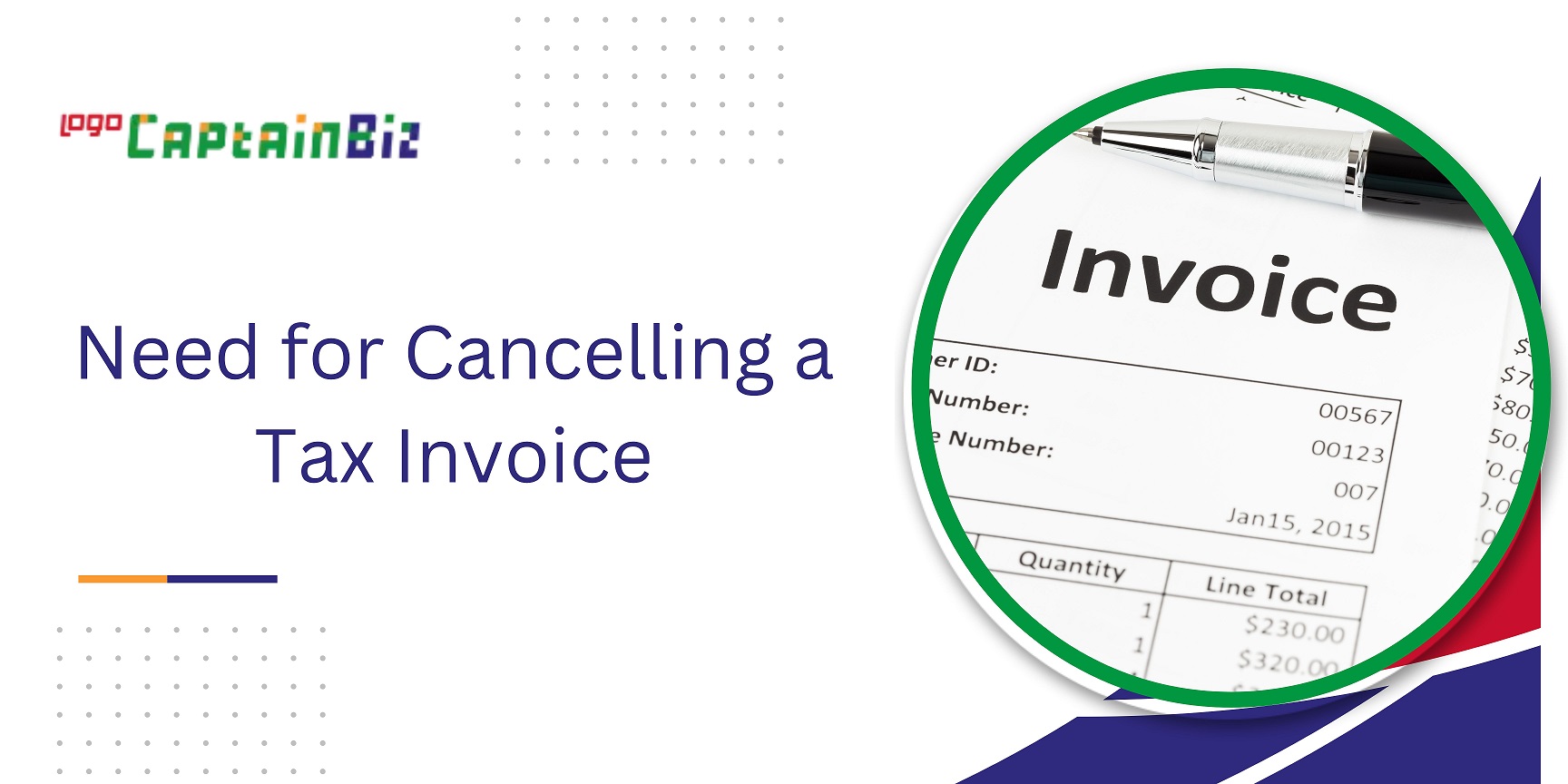The government of India took a massive step forward with the taxation system with the introduction of GST. In the past few years, the taxation system has been updated to create a unified tax, GST. When a supplier supplies taxable goods or services, they need to pay one GST. It is common across all states in India. However, the actual type of GST and GST rates differ with states and goods. To further streamline the process, every supply of taxable goods must be validated with a tax invoice.
Issuing tax invoices is a mandatory requirement for businesses to stay GST-compliant. Even if you are careful while generating invoices, mistakes are inevitable. The consequences of not cancelling a tax invoice can become overwhelming for businesses.
In this blog, we will explore why it is essential to cancel a tax invoice and how it can affect GST compliance.
Implications of GST
The indirect taxation system used in the past was ambiguous. The GST Act was introduced to prevent tax evasion and fraud. The new GST law requires all registered taxpayers to pay only one GST for taxable goods and services. There are no indirect taxes. Based on the origin and destination of goods, suppliers must pay CGST, SGST, or IGST.
Exporters can export goods to SEZ units without paying tax. This reduced the burden on exporters. It simplified supplying goods to other countries.
To streamline the tax filing process, the government launched the GST portal. Every registered taxpayer must submit their GST return files on the GST portal. These returns must be filed on a monthly, quarterly, and annual basis.
However, it is challenging for businesses that still use manual processing. You can submit printed invoices for GST returns, but you must invoice details digitally on the GST portal. When businesses use digital billing tools, they can create GST-compliant invoices with a single click. Digital invoices can be uploaded to the GST portal seamlessly.
From August 1, 2023, businesses with over 5 crore turnover must generate e-invoices. Currently, businesses with more than 100 crore turnover must generate e-invoices within 7 days from the date of supply. These regulations mean that businesses must generate digital invoices in real time.
Real-time invoice generation and documentation improve accuracy. It will avoid tax fraud when the data is uploaded in real time. The fields of GST returns are auto-populated through GSTN. As multiple phases of e-invoicing are rolled out, all registered businesses must always generate e-invoices.
Need for Cancelling a Tax Invoice

Even with automated GST billing software, businesses may need to cancel invoices occasionally. GST compliance requires businesses to maintain accurate records of all transactions. So, you must maintain records of generated, modified, deleted, and cancelled invoices at all times. Some of the reasons why it may be necessary to cancel a tax invoice are:
-
Errors in the Invoice
When the tax invoice is generated with errors, you must cancel it and issue a corrected one. Details such as buyer and seller details, price amount, GSTIN code, HSN code, address of supply, etc must be mentioned correctly. Buyers require accurate invoices. You can ensure GST compliance only with accurate invoices.
-
Duplicate Invoices
Sometimes, you may issue duplicate invoices for the same tax invoice. This can happen due to human error. When you use an automated tool, you may accidentally create duplicates. You must cancel the duplicates to avoid over-reporting of revenue. It will result in excess tax liability.
-
Issuing Invoices When Not Required
A tax invoice is needed only during the supply of taxable goods and services. If you supply exempted goods, there is no need to generate a tax invoice. When you accidentally create a tax invoice when it is not needed, you must cancel it. It will help with accurate record-keeping.
-
Changes in Transaction Details
Sometimes, you may want to change the price of the goods after issuing the invoice. Your buyer may ask for a discount later. In such cases, the invoice amount will vary. If there is a change in the agreed price, you must cancel the original invoice. You can generate a new invoice with updated price details and issue it for GST compliance.
-
Cancellation of Order
The most common reason for cancelling a tax invoice is when the buyer cancels the order. Changes in business relationships must be expected. Many times, suppliers generate invoices before supplying goods. So, when an order is cancelled, you must cancel the associated tax invoice.
-
Legal Requirements
In some specific cases of GST Law, the authorities may want you to cancel an invoice. Your auditor may want to change the invoices to eliminate discrepancies. In such cases, invoice cancellation becomes necessary.
-
Buyers’ Request
Running a business involves maintaining good relationships with your customers. Sometimes, the customers may want you to cancel an existing invoice and create a new one to accommodate changes from their end. As a supplier, you may have to comply with their request and cancel a tax invoice.
Whatever may be the reason, if the need arises, you must cancel the generated tax invoice in the right way. Simply deleting the invoice from your records or putting the printed bill in the dash is not ideal for GST compliance. You must follow the invoice cancellation procedure to avoid penalties for not cancelling a tax invoice.
Key Points to Remember While Cancelling Invoice
Through the GST portal, you can cancel multiple invoices at once. You can do it online directly on the GST portal. For bulk cancellation of invoices, you can download the JSON file, use an offline tool to access the file, and cancel invoices. Then, you must generate a JSON file and upload it to the GST portal.
You can only cancel invoices for valid reasons. Manipulating invoices for the sake of reducing GST liabilities is an offence according to the GST law. You must pay GST tax for all the invoices generated during the tax period. If you cancel the invoice, it will be updated in the GST return of the recipient, too. They will not be able to claim ITC for cancelled invoices.
If you export taxable goods for which GST must be paid, you must generate a tax invoice and IRN. When the export order cannot be fulfilled, you must cancel the tax invoice correctly.
The invoice can be cancelled only if the supply is not made. Once you supply goods and services, the tax invoice must be issued. You are also responsible for paying the GST tax associated with the supply, regardless of whether the buyer has made the payment.
Once you cancel an invoice, it will be marked as cancelled. You cannot use the invoice number again. If you want to reissue an invoice, you must generate a new invoice with a new invoice number.
Consequences of Not Cancelling a Tax Invoice
A tax invoice is integral for GST compliance for businesses. If you don’t cancel the invoice stored in the GST network, you may have to face GST tax invoice cancellation penalties. Some of the common consequences you must face if you don’t cancel the tax invoice properly are:
Audit and Penalties
When there are discrepancies in the submitted invoices for GST returns, the tax authorities may trigger an audit. GST audits are expensive and cause business disruptions. Not cancelling invoices when it is required can result in penalties and fines. You may have to bear additional and unnecessary tax liabilities.
Legal Consequences
When you don’t cancel the tax invoice and a fraudulent buyer uses it to claim Input Tax Credit (ITC), it may become your fault. You may be considered as helping a business commit tax fraud. In that case, you may face tax invoice cancellation penalties for small businesses that can go up to Rs. 25,000.
Wrong ITC Claims
You can claim for ITC on your purchases to offset GST collected through sales. If you fail to cancel a tax invoice and upload an invoice with errors, you may claim incorrect ITC. Over-claiming ITC will be considered tax evasion, which can result in penalties.
Reversal of ITC
In some cases, when ITC claims are of high value, tax authorities may reverse ITC claims on invoices that must have been cancelled. It can also result in tax invoice cancellation penalties for exporters.
Problems During Return Filing
Not cancelling a tax invoice can create problems during return filing. If you have issued a tax invoice but didn’t supply goods, it will be considered a fake invoice. It can result in reconciliation errors. Also, when the correct invoice details are not provided at the time of filing your GST returns, you must deal with audits and penalties.
Loss of Tax Benefits
When several fake invoices are flagged, the authorities may flag your business. Depending on your case, you may even lose several tax benefits. You may also become ineligible to claim deductions under income tax. It can also affect your business’s credibility as a GST-compliant business.
Conclusion
The consequences of not cancelling a tax invoice can result in huge penalties. It can be 100% of the tax amount or at least a penalty of Rs. 10,000. When you don’t maintain accurate invoices, it can trigger GST audits in the system. This will incur additional costs and affect your business reputation. Exporters must be careful with the cancellation of invoices because they need to deal with international banks, too.
Are you worried about ensuring the accuracy of your business transactions for GST compliance? Sign up with CaptainBiz for hassle-free maintenance of invoices and purchase orders. Always generate GST-compliant invoices and bills. Upload your GST reports directly to the portal with a single click and reconcile bank accounts seamlessly.
FAQs
-
Can I cancel a part of the invoice?
You cannot cancel a portion of the invoice. When an invoice must be cancelled, it must be cancelled fully. You must generate a new invoice with the necessary details later. Partial cancellation of invoices is not allowed as per GST.
-
How can I cancel my invoice when it has an e-way bill?
If an e-way bill is already generated for an invoice, it cannot be cancelled directly. You must take action to cancel the e-way bill first. You must communicate with the transporters and recipients and ensure proper cancelling of the e-way bill. The e-invoice can be cancelled only if it has no e-way bill associated with it.
-
Can I use the IRN of a cancelled e-invoice for another e-invoice?
No. The IRN generated is unique to the invoice issued. When you cancel an e-invoice, you cannot reuse the IRN number. Register the new invoice on the e-invoice portal, verify it, and generate a new IRN. You can never use the same IRN for two invoices. It will be considered a fake invoice or fraud.
-
Can I cancel my invoice at any time?
If the reasons are correct, you can cancel the invoice easily before submitting the GST return for the tax period. For e-invoices, you can cancel the invoice directly on the e-invoicing portal using the IRN if you cancel the invoice within 24 hours. After that time lapses, you must use the GST portal to cancel the e-invoice.
-
Can I cancel the invoice for which the GST return has been submitted?
If you have filed a GST return for a financial period, you cannot cancel the invoice that is already submitted. You must use a credit note in the current GST form to offset the GST liabilities on a cancelled invoice.

